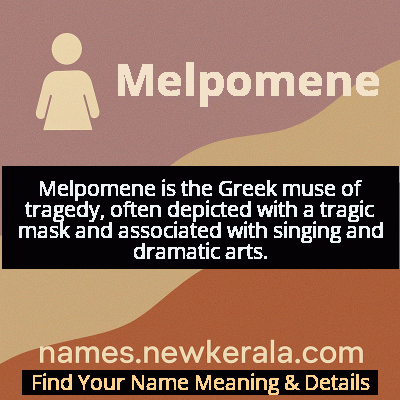Melpomene Name Meaning & Details
Origin, Popularity, Numerology Analysis & Name Meaning of Melpomene
Discover the origin, meaning, and cultural significance of the name MELPOMENE. Delve into its historical roots and explore the lasting impact it has had on communities and traditions.
Name
Melpomene
Gender
Female
Origin
Greek
Lucky Number
8
Meaning of the Name - Melpomene
Melpomene is the Greek muse of tragedy, often depicted with a tragic mask and associated with singing and dramatic arts.
Melpomene - Complete Numerology Analysis
Your Numerology Number
Based on Pythagorean Numerology System
Ruling Planet
Saturn
Positive Nature
Ambitious, efficient, realistic, and authoritative.
Negative Traits
Materialistic, stressed, confrontational, and can be overly ambitious.
Lucky Colours
Dark blue, black.
Lucky Days
Saturday.
Lucky Stones
Blue sapphire, amethyst.
Harmony Numbers
2, 4, 6.
Best Suited Professions
Business leaders, managers, financial services, law enforcement.
What People Like About You
Leadership, determination, organizational skills.
Famous People Named Melpomene
Melpomene (Mythological)
Greek Muse
Inspiration for tragic drama and funerary songs in Greek mythology
Melpomene (Asteroid)
Celestial Body
18th asteroid discovered, named after the tragic Muse in 1852
Melpomene Marina
Academic Researcher
Contributions to Greek tragedy studies and classical reception
Melpomene Kancheli
Opera Singer
Renowned interpretations of tragic operatic roles
Name Variations & International Equivalents
Click on blue names to explore their detailed meanings. Gray names with will be available soon.
Cultural & Historical Significance
During the Renaissance, Melpomene experienced a revival as classical learning was rediscovered, appearing in artworks, poetry, and theatrical references. In the 18th and 19th centuries, her symbolism was embraced by Romantic artists and writers who valued emotional intensity and the sublime. Today, Melpomene remains a powerful symbol in academic circles, theater communities, and classical studies, representing the enduring human need to explore darkness and find meaning in suffering through artistic expression. Her legacy continues in modern psychological understandings of catharsis and the therapeutic value of engaging with tragic narratives.
Extended Personality Analysis
Those bearing the name Melpomene often exhibit a complex personality marked by emotional depth, artistic sensitivity, and philosophical inclination. They tend to be perceptive individuals who notice subtleties others might miss, particularly in emotional contexts and human relationships. Their natural empathy makes them excellent confidants, though they may need to guard against absorbing others' emotional burdens. Many Melpomenes demonstrate a strong aesthetic sense and creative talent, whether in traditional arts, writing, or performance.
In social settings, Melpomenes often display a thoughtful, somewhat reserved demeanor that can be mistaken for aloofness but actually reflects their contemplative nature. They value genuine connection over superficial interaction and typically maintain small circles of deep friendships. Professionally, they gravitate toward fields that allow for creative expression, emotional exploration, or helping others navigate difficult experiences. While they may struggle with the weight of their own sensitivity, they often develop remarkable resilience and wisdom, transforming personal challenges into sources of strength and insight that benefit both themselves and those around them.
Modern Usage & Popularity
In the 21st century, Melpomene remains one of the rarest mythological names in use, with only occasional appearances in birth records, primarily in Greece and among families with strong classical interests. The name's association with tragedy, while culturally significant, may deter some parents who prefer more overtly positive namesakes. However, among those who choose it, the name represents a commitment to artistic values, intellectual depth, and cultural heritage. Recent trends show increasing interest in unique mythological names, which may lead to greater consideration of Melpomene among parents seeking distinctive names with historical weight. The name appears more frequently in academic and artistic contexts than in general population, and its usage often reflects parents' backgrounds in classics, theater, or literature. Despite its rarity, Melpomene maintains a presence in cultural consciousness through continued references in education, arts, and popular media.
Symbolic & Spiritual Meanings
Symbolically, Melpomene represents the essential duality of human existence—the interdependence of joy and sorrow, success and failure, life and death. Her tragic mask symbolizes the transformative power of assuming different emotional states and perspectives, reminding us that understanding often requires stepping outside ourselves. The name embodies the concept that true wisdom frequently emerges from confronting difficulty rather than avoiding it. Melpomene also symbolizes the artistic process itself—the transformation of raw emotion into structured expression that can communicate across time and culture.
Metaphorically, Melpomene represents the idea that suffering, when given voice and form through art, can become a source of connection and meaning rather than isolation. She symbolizes the human capacity to find beauty in brokenness and to create order from chaos. In psychological terms, she represents the therapeutic value of narrative and the importance of acknowledging and processing difficult emotions. Her enduring presence in culture suggests that the human need to explore tragedy through art remains fundamental to our understanding of ourselves and our place in the world.

